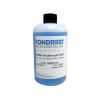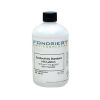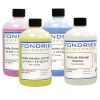Hach sensION+ 5059 Portable Multi-parameter Electrode
Features
- Determine multiple parameters in the field with one standard sized electrode
- Heavy-duty electrode handle design optimized for field calibration and storage
- Low maintenance design
- Free ground shipping
- Expedited repair and warranty service
- Lifetime technical support
- More
Overview
The Hach sensION+ 5059 Portable Multi-parameter Electrode measures pH, conductivity and temperature. It has a plastic body, non-refillable gel reference electrolyte and built-in temperature sensor. The standard-sized electrode has a fixed 1-meter cable and MP8 connector dedicated for use with Hach sensION+ MM150 portable meters. The Hach sensION+ 5059 Portable Multi-parameter Electrode has a ceramic pin reference junction and glass (pH), titanium (conductivity), and Pt1000 (temperature) sensors. It is ideal for measurements in general aqueous applications.
Design
The Hach sensION+ 5059 Portable Multi-parameter Electrode's non-refillable gel reference electrolyte and ceramic pin junction with an integrated Pt1000 temperature sensor provides accurate, stable results without concerns for repeated maintenance. Its resilient polycarbonate body, handle, and MP8 connecter ensure protected performance in the field. Its heavy-duty electrode handle design is optimized for field calibration and storage, as the tubes screw directly onto the electrode handle. This design provides a secure interface between the electrode and calibration/storage tube, reducing the risk of contamination.
In The News
Ocean acidification: University of Washington's giant plastic bags help control research conditions
With oceans becoming more acidic worldwide, scientists are getting creative in designing experiments to study them. For example, one group at the University of Washington is using giant plastic bags to study ocean acidification. Each bag holds about 3,000 liters of seawater and sits in a cylinder-like cage for stability. The group at UW, made up of professors and students, is controlling carbon dioxide levels in the bags over a nearly three-week period, during which they are looking at the effects of increased acidity on organisms living near the San Juan Islands. “These mesocosms are a way to do a traditional experiment you might do in a lab or classroom,” said Jim Murray, professor of oceanography at the University of Washington.
Read MoreNOAA Alaska buoy network to monitor North Pacific ocean acidification
National Oceanic and Atmospheric Administration scientists detected signs of ocean acidification in the waters that hold the vulnerable and valuable fisheries of the North Pacific off the coast of Alaska, but they only had a snapshot of the action. “We know that in this place were important commercial and subsistence fisheries that could be at risk from ocean acidification,” said Jeremy Mathis, a NOAA Pacific Marine Environmental Laboratory researcher and professor at the University of Alaska Fairbanks. To understand how ocean acidification affects the North Pacific, NOAA scientists created a mooring network that collects constant in situ data on parameters contributing to acidification. They hope it will reveal seasonal trends and patterns left out by their snapshots.
Read MoreSave our Bogs! Culture, Conservation and Climate Action in Ireland’s Peatlands
Characterized by long-term accumulation under waterlogged conditions, peatlands exist on every continent and account for 3-4% of the global land surface . Small but mighty, these often overlooked wetland environments are estimated to hold as much as one-third of the world's organic carbon in their soil—twice the amount found in the entirety of the Earth's forest biomass. While healthy peatlands can trap and store carbon, regulate water, and provide important habitats for rare species, human alteration has disturbed peatland carbon and nitrogen cycles on a global scale. Approximately 12% of the world’s peatlands have been drained and degraded through conversion for agriculture, forestry, infrastructure development, and other uses.
Read More
















